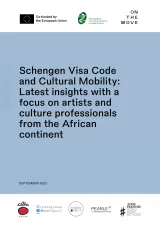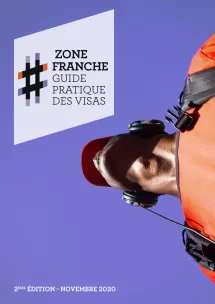11 years after the online publication of the report Artists’ mobility and visas: a step forward, On the Move decided, as part of the EU co-funded Deconfining project, to produce another report on the still complex issues of the visa process with a particular focus on the African continent and the Schengen Code of visas (Visa Code).
This report is based on a collaboration with On the Move’s members and/or partners who have been working on the issue of visas and challenges related to the circulation of artists and culture professionals for many years: alba KULTUR, Pearle* - Live Performance Europe, the International Music Council, and Zone Franche, as well as the Mobility Info Points.
This collaboration is extended to the 131 individuals in Africa, and the representatives of organisations in Schengen countries, who answered surveys that were available online from 27 April - 20 June 2023. In total, their responses correspond to at least 435 Schengen visa cases for artists and culture professionals from the African continent since June 2019 and the revision of the Code of Visas.
The survey results compiled in this report generally echo the findings of the research earlier from 2012. Some key points:
- When asked which problems they had faced with visa applications made since June 2019, the two top problems for individuals were: difficulty scheduling appointments, and requests for non-compulsory documents. Other problems included lack of a relevant national embassy/consulate in the applicant’s home country, and, in the case of rejected visas, refusal on grounds of ‘lacking financial means for subsistence’ or ‘insufficient proof of commitment to return’.
- The visa process is opaque: 45.5% of individuals and 59.3% of organisations did not receive a final reason in the case of visa rejections, even though this is compulsory in the Visa Code.
- Visa rejections have multifaceted impacts – on careers, on finances, on local sectors, on audiences. Asked about the career effect of visa rejections, individual respondents pointed to loss of networking opportunities, loss of opportunities to work with peers, loss of visibility, and loss of income, with 22.9% of respondents who suffered a career effect suffering all four of these.
- Most individuals and organisations surveyed see external providers as having a negative impact.
- 4 in 5 individuals described the visa application experience (in the case of problems and/or rejections) as stressful and anxiety inducing.
- 76.7% of individuals and 91.4% of organisations did not perceive any improvement in the visa process since the end of Covid restrictions.
- Only 4.7% of individuals and 5.7% of organisations saw an improvement in the process since the revision of the Visa Code, with the majority of respondents in both surveys not aware this revision had taken place.
However, on the positive side, the survey respondents also highlighted that solutions are possible such as through the:
- Digitisation of the visa process.
- Better training for embassy/consulate staff and staff working within external agencies.
Other areas artists and culture professionals indicated as priorities for improvement:
- Better training for the arts sector itself.
- Greater transparency regarding external agencies in the visa process.
- More exchange between ministries of interior affairs, foreign affairs and cultural affairs in Schengen countries.
Respondents, and particularly individuals place greater emphasis on personal access to tools, information and training.


